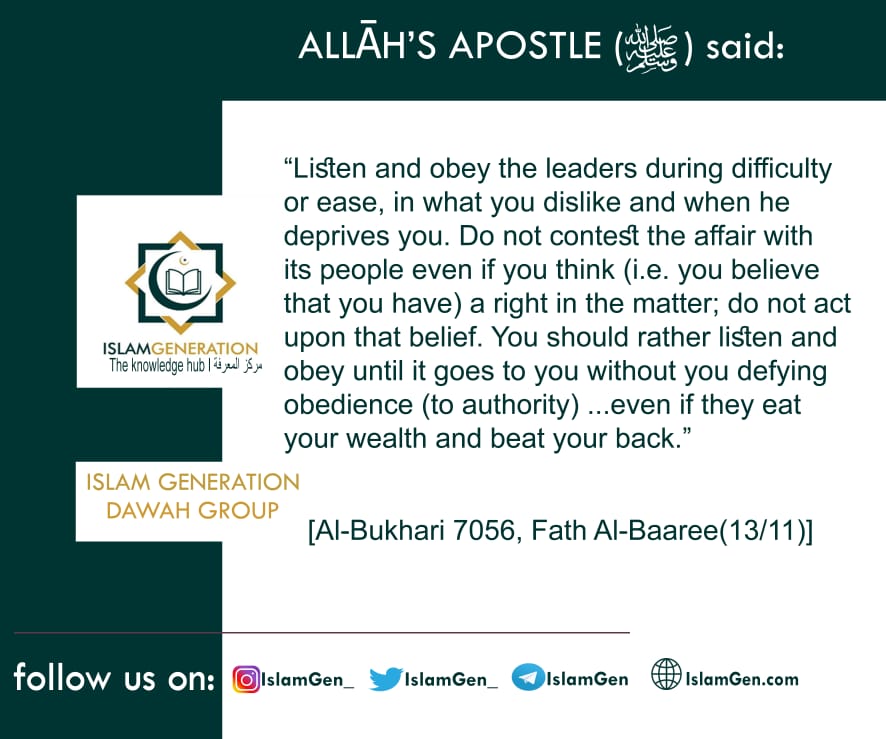﷽
EPISODE 6️⃣: Protests Encourage Disobedience to Constituted Authority

The leader in authority over the people has the right to be obeyed when he commands good; and not to be disobeyed as long as he does not order what Allāh (ﷻ) and His Messenger (ﷺ) clearly prohibit nor command that what He the Exalted and His Messenger order should be left.
Thus, Allāh’s Messenger (ﷺ) said, “Listen and obey the leaders during difficulty or ease, in what you dislike and when he deprives you. Do not contest the affair with its people even if you think (i.e. you believe that you have) a right in the matter; do not act upon that belief. You should rather listen and obey until it gets to you without you defying obedience (to authority).
In another version it adds: even if they eat your wealth and beat your back.”
[21 The foundation of the hadeeth is contained in Saheeh al- Bukhaaree (7056). The other increments are contained in Musnad Ahmad and Saheeh Ibn Hibban. Fath al-Baaree (13/11)]
Salamah bin Yazeed al-Ju’fee (رضي الله عنه) asked the Messenger of Allāh (ﷺ), “O Prophet of Allāh! What do you consider appropriate when we have rulers who ask us for their rights but deny our own rights. What do you order us (to do)?”
The Prophet (ﷺ) turned away from him. Thereupon, he asked him again and he turned away the second or third time. So, Ash’ath bin Qays (رضي الله عنه) pulled him back.
Then the Messenger of Allāh (ﷺ) said, “Listen and obey; they will surely shoulder their burdens and you will bear your own burdens too.”
[Muslim (4782)]
The leader’s usurpation of the wealth of the followers is, no doubt, a great sin and injustice, but it does no—based on this hadeeth and others in its meaning—justify denying his right to be listened to and obeyed in goodness.
Likewise, it does not provide the ground for rising against him! This is the ruling of Allāh’s Messenger (ﷺ) and his wise politics.
[Hukm al-Mudhaahaaraat li ash-Shaykh Abdil-Malik Ramadaanee (pg. 15)]
Imam al-Kirmaanee [Al-Imam Harb bin Ismaa’eel al-Hanzalee al-Kirmaanee, the eminent student of Imam Ahmad bin Hanbal and teacher of the two Ar-Raazees—Abu Haatim and Abu Zur’ah (رضي الله عنهم). He died 280 AH.], may Allāh shower blessings on him, stated what the scholars of Sunnah were upon on the matter.
He said: “And to obey the one Allāh places over your affairs. Do not be disobedient in the least. Do not take arms against him until Allāh will bring relief and a way out. Do not rise against authority; listen and obey. Do not break the allegiance given him.
Whoever does that is an innovator, an insurgent and rebel against the Jama’ah. If authority commands you to do a thing which is sin against Allāh, you should not follow him. Yet, it is not for you to rise against him or deny him his rights.”
[Al-Aathaar Al-Waaridah ‘an as-Salaf fee al-‘Aqeedah (pg. 2/535),]
Imam Abu Zayd al-Qayrawaanee [in Masaail al-‘Aqeedah allatee Qarrarahaa al-I’mmat al-Maalikiyyah (pg. 240). He also mentioned it as the position of Imam Malik bin Anas (رحمه الله)], Sadru-Deen as-Sulamee [in Mu’aamalaat al-Hukkaam (pg. 83 and 84)], an-Nawawee [in Sharh an-Nawawee (11/432) cited from Wa Jaadilhum bil-Latee hiya Ahsan (pg. 9)], Ibn Battaal, Ibn Hajar [Fath al-Baaree (13/10)] and many others amongst the pious predecessors (may Allah shower blessings on them all) have cited this text-based consensus that: the injustice and sin of rulers is not sufficient grounds for rising against constituted authority.
To be continued… إِنْ شَاءَ ٱللّٰهُ
==============================
🕋 ISLAM GENERATION DAWAH GROUP
For such posts, check out:
Website: http://www.IslamGen.com
Telegram:
https://t.me/IslamGen
Twitter: https://twitter.com/IslamGen_
Instagram: https://Instagram.com/IslamGen_

